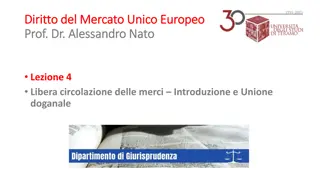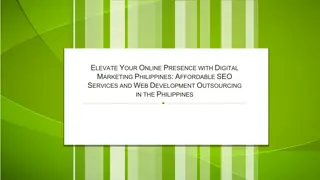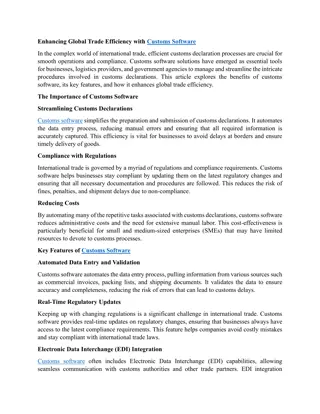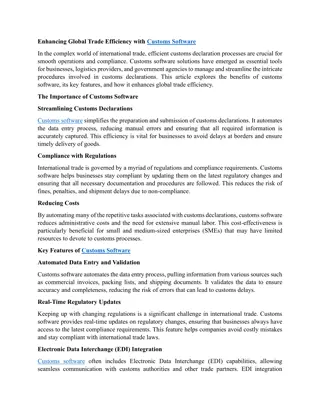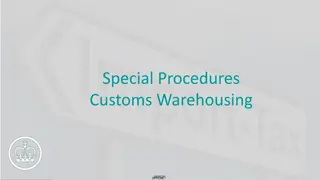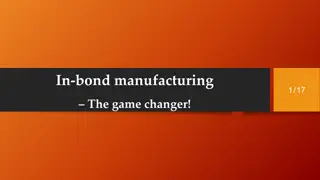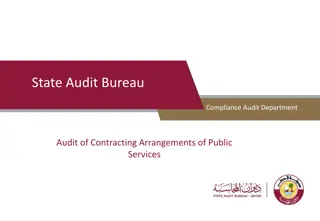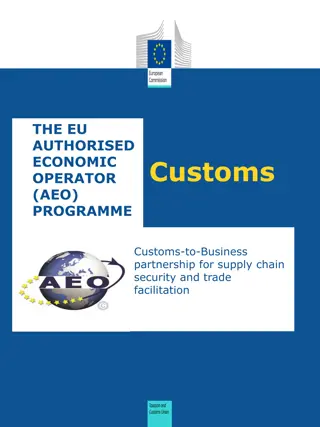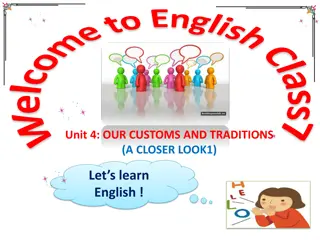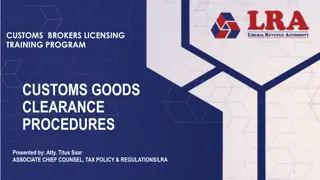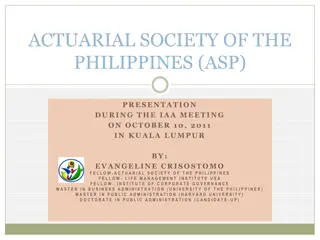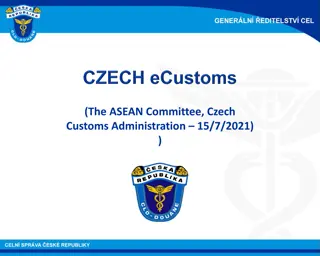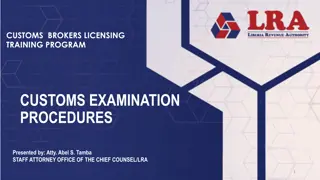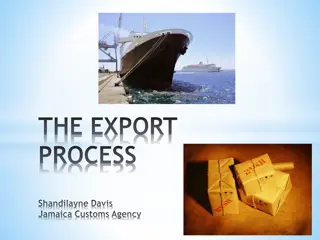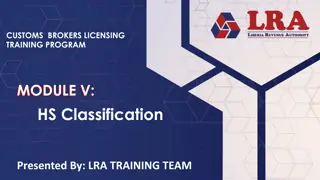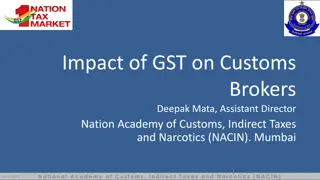Evolution of the Bureau of Customs in the Philippines
The Bureau of Customs (BOC) in the Philippines has undergone several reorganizations and structural changes since its establishment in the early 20th century. From being under the supervision of the Department of Finance and Justice to becoming a vital revenue-generating agency, the BOC has evolved to strengthen border control, enhance trade facilitation, and improve the collection of lawful revenues.
Download Presentation

Please find below an Image/Link to download the presentation.
The content on the website is provided AS IS for your information and personal use only. It may not be sold, licensed, or shared on other websites without obtaining consent from the author. Download presentation by click this link. If you encounter any issues during the download, it is possible that the publisher has removed the file from their server.
E N D
Presentation Transcript
History of the Bureau of Customs The Bureau of Customs (BOC), then the Bureau of Customs and Immigration, was established out of Philippine Customs Service under the supervision of Department of Finance and Justice by virtue of Public Act No.430. During the Commonwealth Government, the Bureau of Immigration was created as a separate entity of the BOC through the Commonwealth Act No. 613. The Bureau s major reorganization in 1965 paved the way for the creation of offices under the direct supervision and control of the Commissioner of Customs which were later transformed into the following departments: Public Relations, Personnel, Legal, Administrative Service, Budget and Finance, and Management Improvement. This resulted to the designation of heads of different services and the abolition of the offices of directors for Administration and Operations, and the Assistant Commissioner for Revenue. Three years after, the BOC went through reorganization pursuant to PD No.689 which created the current structure of the bureau.
History of the Bureau of Customs In 1986, the BOC went through another major reorganization to expand the structure of the Central Office by virtue of Executive Order No.127, creating different offices such as the Office of the Deputy Commissioners and Assistant Commissioners that will manage the assessment and operations of the Bureau of Customs. With the growing economy and the strategic role of the Bureau of Customs, the Management Information System Group (MISTG) was created, in line with the provisions of Executive Order No.463 issued in 1998 and signed by President Fidel V. Ramos, to ensure progress and development in implementing the computerization program of the bureau.
Who We Are (Agency Profile) The Bureau of Customs is a revenue generating government agency operating under the auspices of the Department of Finance and is the country s second biggest revenue earner. Based on the Customs Modernization and Tariff Act (CMTA), the Bureau is mandated to assess and collect the correct amount of duties and taxes on imports.
Who We Are (Agency Profile) The Bureau of Customs envisions a Modernized and Credible Customs Administration that is among the World s Best. Our mission is to strengthen border control, enhance trade facilitation, and improve collection of lawful revenues.
Customs Employee Governance Culture Code BOC CULTURE CODE I will be professional, morally upright and accountable for my work and peers
Service Pledge I am a public servant of the Bureau of Customs, who shall serve with utmost Professionalism, Integrity and Accountability to ensure lawful revenue collection, trade facilitation, and border protection in the promotion of national development. I will perform my duty with excellence to the best of my ability. As a Public Servant, I will uphold the time- honored principle that Public Office is a Public Trust. I will promote transparency and support the elimination of red-tape and eradication of all forms of corruption.
Service Pledge I will serve with courtesy, act with fairness and sincerity and provide efficient service to everyone. I will not discriminate against anyone regardless of age, creed, gender, political affiliation, race, special needs, or status. As a Frontliner of the Bureau of Customs, I will serve with honor So Help me God. and dignity.
As Customs Employees we are Committed to be: Competent and Efficient Accountable and Responsible Honest and Dedicated Firm and Fair Helpful and Courteous Simple in Lifestyle
Core Values The BOC is committed to: Professionalism Integrity Accountability
Position A Transparent, Responsive, World-Class Customs Administration by 2022
What we Aspire to Do (Our Aspirations) We aspire to be the Center of Excellence in Customs Administration through the delivery of World-Class Customs Services more responsive to client s need, supportive of government goals, adhering to world s best practices, and fostering cooperation with the private sector in building a dynamic organization. Thus, we are committed to establish and sustain a culture accountability, professionalism, integrity, transparency, efficiency responsibility in pursuit of our fundamental functions of efficient revenue collection, enhanced trade facilitation and prevention of smuggling and entry of prohibited imported goods in compliance with global standards and regulatory frameworks. of competence, and ethical
Goals In support of our Vision and Mission we will aspire to: 1. Grow and pursue eminent leadership position in Fiscal Administration; 2. Create new opportunities to leverage world-class Customs service; and 3. Sustain a multi-stakeholder benefit of Customs Administration.
Strategic Objectives in the Next Three Years (FY 2020-2022) To achieve a competitive position in governance and public administration, we are committed to: a. Maximize collection of lawful revenues by reengineering the current assessment process and strengthening the Post-Clearance Audit in order to detect fraud and revenue leakages; b. Reduce the number of smuggling and suppress the entry of prohibited imported goods in compliance with existing regulations through the use of Information Communication Technology to secure advance information on importation; laws, rules and c. Improve service efficiency through automation and computerization of customs transactions to reduce personal contact with customers by implementing a fully automated system that will ensure expeditious clearance of goods and passengers;
Strategic Objectives in the Next Three Years (FY 2020-2022) d. Upgrade the human resource management function to address the current and future business needs of the BOC by institutionalizing meritocracy and professionalism and cultivating a culture of transparency and accountability in Customs Service; e. Achieve total customer satisfaction through secured and efficient trade facilitation by building necessary infrastructure and IT Systems that will support the re-engineered Customs Process; f. Implement international commitments on customs and trade; and, g. Strengthen cooperation and partnership with the private sector to promote business in the country.




